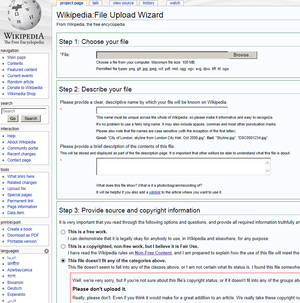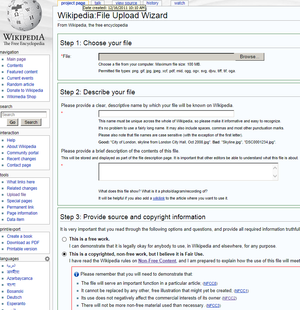Difference between revisions of "Internal:Public Policy/Orphan works"
(pix of upload screen -- may be worth showing to the Copyright Office -- shows how our users will certify/use the system) |
|||
| Line 48: | Line 48: | ||
* Wikimedia is systematically careful about copyright |
* Wikimedia is systematically careful about copyright |
||
| ⚫ | |||
| − | === more sources === |
||
* [http://www.copyright.gov/fedreg/2014/79fr7706.pdf The ''Federal Register'' notice] says we have till April 14 to submit a statement |
* [http://www.copyright.gov/fedreg/2014/79fr7706.pdf The ''Federal Register'' notice] says we have till April 14 to submit a statement |
||
* http://www.ala.org/offices/sites/ala.org.offices/files/content/wo/reference/colresolutions/PDFs/012407-CD20.1.pdf |
* http://www.ala.org/offices/sites/ala.org.offices/files/content/wo/reference/colresolutions/PDFs/012407-CD20.1.pdf |
||
| Line 54: | Line 54: | ||
* http://www.librarycopyrightalliance.org/submissions/domestic/orphan.shtml |
* http://www.librarycopyrightalliance.org/submissions/domestic/orphan.shtml |
||
* [http://www.archivists.org/standards/OWBP-V4.pdf Society of American Archivists' best practices guidance on orphan works] |
* [http://www.archivists.org/standards/OWBP-V4.pdf Society of American Archivists' best practices guidance on orphan works] |
||
| − | |||
| ⚫ | |||
* [http://copyright.gov/orphan/ The workshop page] |
* [http://copyright.gov/orphan/ The workshop page] |
||
* [http://www.copyright.gov/orphan/orphan-report-full.pdf Report on Orphan Works] by the US Copyright Office, 2006 (127 pages plus appendices and comments) |
* [http://www.copyright.gov/orphan/orphan-report-full.pdf Report on Orphan Works] by the US Copyright Office, 2006 (127 pages plus appendices and comments) |
||
Revision as of 21:07, 8 March 2014
Status: Draft
- This is a draft of the Public Policy Committee's report to the Board of Directors on the subject of Orphan Works and Mass Digitization for the U. S. Copyright Office workshop on March 10–11, 2014.
(Partial) Draft
The Wikimedia community is dedicated to creating "a world in which every single human being can freely share in the sum of all knowledge" through its educational projects such as Wikipedia, Wikimedia Commons, and Wikisource. Wikipedia is the fifth most visited website on the Internet, and the largest reference work ever assembled, with 20 million articles over 285 language editions. Wikimedia Commons is a media file repository making available public domain and freely-licensed educational media content, currently containing over 20 million images, sound, and video clips. Wikisource is an online digital library of free content textual sources; English Wikisource alone has over 300,000 texts. As Wikipedia's content is available under a free content license, it is freely available to be seen and used by anyone in the world. We emphasize that the content in these projects is created and maintained not by paid archivists, but by volunteers from around the world and from all walks of life who contribute by editing and uploading files to our wikis on the Internet.
Wikimedia projects have long used public domain and freely licensed works to support our educational mission. These uses include using text and visual media as part of encyclopedia articles, and making them available for reuse by others. However, very few works first published after 1922 are in the public domain, while those that are are usually due to technicalities that are often are hard to verify. Wikimedia projects also use user-provided content granted under a free license such as Creative Commons or GFDL, but these are almost all of very recent vintage. There is this a very large gap where there are very few items that are available for use in Wikimedia's projects, a situation that is a serious setback for our educational mission.
We would very much benefit from legislation that would allow us to use orphan works is a way that imposes a minimal burden on our many volunteers. Simple and clear guidelines for what threshold must be met for a diligent search would reduce uncertainty about when orphan works can be uploaded. Imposing extra technicalities such as requiring users of orphan works to register or pay an escrow fee would make it difficult or impossible for Wikimedia projects to host these works. Limiting monetary liability for non-profit publishers of orphan works would likely be a necessary provision, and it would be important that wiki-based projects like the Wikimedia Foundation be included in the list of exempted organizations along with libraries, archives, and museums.
Outline
Organizing constraints: Speaker has little time -- 5 minutes? 10? and audience does not know Wikimedia. Because there are many speakers, the orphan issue itself is likely to be explained clearly and we do not have to do that in detail
Background
- What are orphan works?
- What copyright-related materials do we store in English Wikipedia and Commons? (Explain Commons)
- How Wikimedia projects have benefited from public domain works: media in Commons, text in Wikisource and Wikipedia, etc.
Examples
Wikimedia projects cannot currently use orphan works; how they would benefit from being able to use them to fulfill our educational mission. What are examples where we struggle with orphan-works copyrights?
The issue will be clear if we have examples to work from.
- Family photos are one case I experienced
- I have a small one. I struggled with the decision about whether to use a photo of economist Bert Hoselitz that came from his family to illustrate the article about him. It wasn't clear what to do and I gave up, to the disappointment of people who had helped me. The original photographer could not be identified. Who held the copyright? How would I label it on Commons? I didn't want to end up in an argument. I'd already had to fight pretty hard to kill off a photo of someone else that was incorrectly labeled as a photo of Hoselitz. The photo was also quite dark--a side issue. To the point: if orphan works were a nicely available permission category on Commons, that would have helped me. -- Econterms (talk)
- one member is often paralyzed with fear regarding materials since 1923 which miht be under copyright, and and retreats to the safe harbor of post-copyright materials before 1923
- ambiguity about US government works which might have been produced by contractors not employees, e.g. those of national labs. photo of scientist example.
- One of our members reports a chilling effect on writing on topics that requires sources written after 1923, due to the incomprehensible copyright laws. She would really like to write new articles about topics that are more modern than clipper ships and defunct Tibetan monasteries, and is eagerly awaiting reforms in the law.
Legislative details
- What do we want in proposed legislation? (likely answer: a feasible, mechanized procedure that Wikimedians can systematically follow that gets us to a "safe harbor" for the orphan/ambiguous cases -- and if a copyright owner shows up we understand the orphan rules don't apply any more and we need permission)
- We might want to illustrate proposed solutions in very practical terms, e.g. with screen shots, to communicate how we'd use it. Communicate that we address this class of issues frequently, and that hundreds of people do so.
- What do we think of the proposed solutions, e.g. in the Copyright Office's 2006 report? Would some be too burdensome for use on Wikimedia projects? (possible answer: they're good, but in addition we'd like to avoid marking up the content being used with an "orphan" stamp, and put that info in the metadata instead if we can)
- How are Wikimedia's needs different than the more well-known case of Google Books etc.?
Points we'd want to make
- we want to avoid anyone having to pay an self-defense fee in escrow. that's an undue burden
- we want to avoid other undue burdens'
- we want the procedure to be simple
- we like the idea that not-for-profit uses have a low low cap or zero on how much they owe for infringement. there is a list of institutions that are eligible for a zero-fee. That includes museums and archives. We would like Wikimedia foundation projects to be on that list
- low-res thumbnail-size pix? as an icon. or for identifying a person or subject? JS says this is a fair-use situation now. Maybe not relevant to orphan works
- Commons's rule is that the material must be in the public domain in the U.S. and in the country-of-origin
- Straightforward rules written at the eighth grade reading level are necessary if you are serious about satisfactory compliance from high school students and people who speak English as a second language. Complicated and difficult rules are unlikely to result in satisfactory compliance by high school students and second language speakers. The Internet makes it possible for people of all ages and language abilities to interact with digital works, and our rules on copyright need to be usable by the full spectrum of Internet users.
- Wikimedia is systematically careful about copyright
Sources
- The Federal Register notice says we have till April 14 to submit a statement
- http://www.ala.org/offices/sites/ala.org.offices/files/content/wo/reference/colresolutions/PDFs/012407-CD20.1.pdf
- http://www.ala.org/advocacy/copyright/orphan
- http://www.librarycopyrightalliance.org/submissions/domestic/orphan.shtml
- Society of American Archivists' best practices guidance on orphan works
- The workshop page
- Report on Orphan Works by the US Copyright Office, 2006 (127 pages plus appendices and comments)
- A 2011 background paper on mass digitization by the Copyright Office, especially see pp. 25ff
- This page's talk page
- Discussion at Wikipedia Village Pump
- WMDE Statement on Orphan Works, Berlin, August 10, 2012

